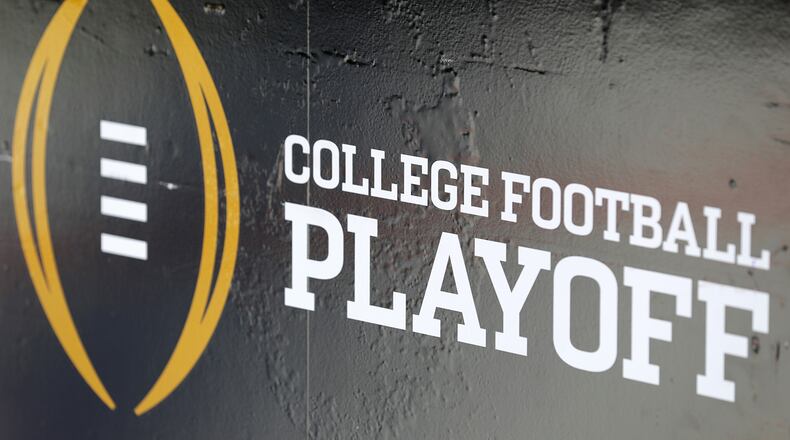ESPN reports that ESPN is negotiating a new media rights agreement with the College Football Playoff that will be worth nearly $1.3 billion annually. That would be more than double the amount of the current contract. The new CFP deal is the latest development in the inevitable split of big-time football schools from the rest of the NCAA.
The Power 5 schools have gained more autonomy as they’ve generated exponentially more revenue. The NCAA’s power over them has waned as it continues to lose in courtrooms regarding athlete compensation. The influx of more CFP cash will increase those tensions.
Something has to give. The Knight Commission on Intercollegiate Athletics believes it should be the NCAA’s governing structure.
The influential reform group isn’t calling for a split of football schools from the NCAA. Rather, it proposes a new “FBS football-centric” governing structure that is separate from the NCAA. Under the Knight Commission’s plan, the NCAA would continue to conduct championships in other sports, including the popular March Madness tournaments for men’s and women’s basketball.
The commission first made the recommendation in 2020. News of the “biggest pot of money in the history of college sports” prompted renewed calls for the NCAA to adopt the plan.
“Our proposal would be better for athletes and the long-term health of the sport,” Knight Commission CEO Amy Privette Perko said in an interview.
The commission makes a persuasive case for that argument. For one thing, FBS football doesn’t share any of the CFP revenue with the NCAA while the NCAA absorbs some costs related to FBS football. The commission projects that the NCAA would save more than $100 million by shedding those costs and excluding FBS football from its revenue distribution formula.
More important, if the NCAA adopts the commission’s proposals, it’s more likely that money and CFP revenue would benefit athletes. Ensuring the welfare of athletes always has been one of the stated principles of NCAA schools. They’ve rarely done that in practice, especially once the dash for cash accelerated.
The Knight Commission has been a driving force behind NCAA reforms that help athletes. It’s proposal for a separate entity to govern FBS is another good one.
The commission notes that, unlike the NCAA, the FBS conferences don’t require that any of the CFP money distributed to schools is used for athlete education, health and safety. That’s why the commission’s proposal for a new structure for FBS football also includes recommendations for how that money is spent and who has a voice in those decisions.
The commission says the new FBS structure should include “meaningful” representation for current football players in addition to independent experts. The members of the new FBS governing body would help ensure the CFP revenue-distribution model includes incentives for conferences and schools to adopt the commission’s “C.A.R.E.” model. That framework prioritizes education, health, safety and gender equity for athletes.
If the CFP media money doesn’t come with those strings attached, then we already know where most of it will go. Coaching salaries already are out of control at what are supposed to be educational institutions. That problem will only get worse if, as ESPN reports, the annual revenue from CFP media rights more than doubles in the next deal.
The Knight Commission hired a financial analysis firm to measure the financial consequences of exorbitant spending on coaching salaries, including contract buyouts. The report from September 2023 projects when salaries for the 11 “countable” football coaches at schools will exceed scholarship and medical expenses for all athletes in all sports. The analysis found that nine FBS schools, including Georgia, already reached that point in fiscal year 2022.
If current spending practices continue, then 25 of the 54 Power 5 schools will reach that “crossover point” in fiscal year 2032, according to the report.
“That’s not a future that’s compatible with the principles upon which college sports is built,” Perko said.
NCAA schools can’t collude to set limits on how much they pay coaches. They set salary restricts on assistant coaches in the 1990s and ended up losing an antitrust case before reaching a settlement agreement. However, the NCAA can create financial incentives that would persuade schools to spend more money on athletes, leaving less money in the revenue pot for coach salaries.
The commission believes it’s urgent for those incentives to be tied to the increased revenue that’s part of the CFP media rights deal.
“This is the time, before the money comes in, to put earmarks on that money so it is better directed towards college athletes,” Perko said. “This the time to change.”
Normally, I’d be skeptical that the college leaders would voluntarily make changes that help college athletes and improve the governance of football. Just look at their track record. The current upheaval in college sports regarding athlete compensation is the result of too much greed and not enough vision from decision makers.
However, the Knight Commission has juice with NCAA leaders. It has a strong track record of persuading them to make changes that benefit athlete education. That includes policies tying revenue distributions to schools with the academic performance of sports teams and an academic threshold teams must meet to be eligible for postseason competition.
The school presidents, educators, and faculty and business leaders on the committee (many of them ex-college athletes) have real influence on NCAA policies. There’s a chance college sports leaders will listen to the commission’s recommendations about FBS governance. They should adopt those polices before the CFP media money accelerates the trend of schools becoming untethered from their educational mission.
About the Author
The Latest
Featured

